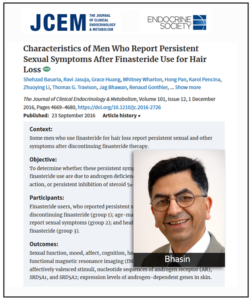SOMERSET, N.J., Sept. 29, 2016 – Men who experience persistent sexual dysfunction after discontinuing finasteride have “neurobiological abnormalities,” suggests a new study published in The Journal of Clinical Endocrinology & Metabolism.
Among those abnormalities is neural circuitry that overlaps with functional abnormalities identified in men suffering from “major depression.”
Titled Characteristics of Men Who Report Persistent Sexual Symptoms after Finasteride Use for Hair Loss, the study was conducted at Brigham and Women’s Hospital in Boston by a team of 19 clinical researchers led by Shalender Bhasin, MD, a professor of medicine at Harvard Medical School.
Key findings of the investigator-initiated study, which included two separate fMRI activation tasks, one targeting affective dysfunction and one focusing on sexual arousal, are as follows:
 Symptomatic finasteride users had “significantly lower IIEF [International Index of Erectile Function] composite score” and “significantly lower scores for each of its domains of erectile function, sexual desire, orgasmic function, intercourse satisfaction, and overall satisfaction.”
Symptomatic finasteride users had “significantly lower IIEF [International Index of Erectile Function] composite score” and “significantly lower scores for each of its domains of erectile function, sexual desire, orgasmic function, intercourse satisfaction, and overall satisfaction.”
- “The PHQ-9 depression scores were significantly higher” in symptomatic finasteride users. Beck Depression Inventory and Hamilton Depression Inventory “also revealed significantly higher depression scores” in symptomatic finasteride users.
- “As sexual function worsened (ie, as IIEF scores went down), there was increasing activity in the neural circuits corresponding to sexual arousal and decreasing activity in brain regions associated with higher level cognitive and motivational networks in symptomatic finasteride users in response to erotic stimuli. This dissociation in activity may be a marker of neural changes post finasteride use.”
- There exists “a significant positive correlation between a subset of BDI [Beck Depression Inventory] scores related to negative attitude and BOLD [blood oxygen level dependent] activity in the right nucleus accumbens, left pregenual anterior cingulate cortex, right insula, right lateral orbito-frontal cortex, and left posterior cingulate, as well as a negative correlation between BDI subscores and BOLD activity in the right parahippocampal/fusiform gyrus. This neural circuitry overlaps with functional abnormalities that have been identified in major depression.”
“This research has several firsts, including use of the latest functional MRI imaging to identify areas of the brain effected by PFS,” said Dr. John Santmann, CEO of the PFS Foundation, which funded the study along with Harvard Clinical Translational Research Institute and the Center for Clinical Investigation at the Brigham and Women’s Hospital.
“It’s a landmark study that not only takes a significant step toward validating the condition on a biological level, but lays the groundwork for future studies that promise to yield effective therapies,” he added.
Please download the full study here.
Post-finasteride syndrome occurs in men who’ve taken finasteride to treat hair loss, or enlarged prostates. Reported symptoms include: loss of libido, erectile dysfunction, depression, suicidal ideation, anxiety, panic attacks, Peyronie’s disease, penile shrinkage, gynecomastia, muscle atrophy, cognitive impairment, insomnia, severely dry skin and tinnitus. The condition often has a life-altering impact on victims and their families, such as job loss and the breakup of marriages and romantic relationships, while also being linked to suicides.
As of Sept. 26, the World Health Organization Programme for International Drug Monitoring’s database of adverse drug reactions contained 13,546 finasteride ADRs, including 3,577 sexual function and fertility disorders, 1,526 depressed mood disorders and disturbances, and 67 completed suicides.
In March 2015, the U.S. National Institutes of Health listed PFS on its Genetic and Rare Diseases Information Center, noting that “some patients who have taken finasteride have referred to side effects such as sexual dysfunction and depression (sometimes severe)… Studies sponsored by the NIH and other organizations are underway to better understand the effects of 5-alpha reductase inhibitor drugs.”
About the PFS Foundation
Headquartered in Somerset N.J., the Post-Finasteride Syndrome Foundation was established in July 2012 as a 501(c)(3) organization, with private grants from families in the U.S. and abroad. Tax-deductible financial donations to the nonprofit organization can be made via PFSFoundation.org, which also houses patient-recruitment information on active clinical studies, published research, research goals, and media reports about PFS. In July 2015, the PFS Foundation partnered with the Southwest Brain Bank in the Department of Psychiatry at the Texas Tech University El Paso. The mission of the brain bank is to function as a donation site for post-mortem human brain and spinal cord tissue of PFS patients, and study that matter to better understand the pathology and etiology of the condition.
# # #
Contact
Philip Roberts
Post-Finasteride Syndrome Foundation
proberts@pfsfoundation.org
(856)425-6046
